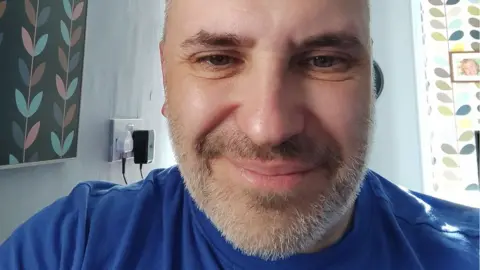Health guidance urges doctors to ask patients about gambling
 David Quinti
David QuintiDoctors should ask people with a mental-health problem about their gambling habits to identify those who need help, draft health guidance says.
It adds that with problem gamblers, GPs should discuss software to limit online gambling and talking therapy treatment at an early stage.
Patients can be referred to one of 12 NHS gambling-treatment clinics in England, with three more planned.
Some 300,000 UK adults are problem gamblers, a recent review found.
And their addiction affects another 3.8 million people, including children.
Men are more likely to gamble than women, the review says, especially online, where 15% of men but only 4% of women gamble.
'I was a good liar'
David Quinti, 49, stopped gambling eight years ago but not before he'd lost £30,000 and hit rock bottom.
"I was in a dark place. I was gambling most of the day, and at work," he says.
"I kept it hidden from everyone and became a very good liar."
It started with football betting and moved on to online roulette, where he started taking bigger and bigger risks.
David went to his GP feeling depressed, and mentioned he was spending too much time gambling.
But his GP focused on his drinking instead and offered him anti-depressants.
Eventually, it was his eight-year-old son's plea to stop that made David change his ways.
"The thought of what I could have lost means I've never relapsed," he says.
'Immense misery'
People with depression, anxiety or thoughts about suicide or self-harm are currently asked about their drinking and drug habits, to see if they have a possible addiction.
And the draft guidance, from the National Institute for Health and Care Excellence (Nice), says healthcare professionals should also ask about their gambling habits, to help identify those who need support and treatment.
Nice interim director for guidelines Prof Jonathan Benger said: "Harmful gambling causes immense misery to all those who experience it.
"We want those needing help or who are at risk to be identified sooner and receive appropriate help. "
'Important role'
NHS gambling clinics can see 3,000 people each year.
And GamCare, a charity which runs the National Gambling Helpline, said healthcare professionals could play "an important role" preventing harm by helping people find support.
"We believe these recommendations, if implemented, will present a greater opportunity to prevent gambling harms from occurring in the UK," director of services Fiona MacLeod said.
Earlier this year, the government published a White Paper on gambling, including plans for a statutory levy on operators, to fund harm prevention and treatment.
A consultation on the draft guidance will run until Wednesday, 15 November.

Has gambling affected your life? You can get in touch by emailing [email protected].
Please include a contact number if you are willing to speak to a BBC journalist. You can also get in touch in the following ways:
- WhatsApp: +44 7756 165803
- Tweet: @BBC_HaveYourSay
- Upload pictures or video
- Please read our terms & conditions and privacy policy
If you are reading this page and can't see the form you will need to visit the mobile version of the BBC website to submit your question or comment or you can email us at [email protected]. Please include your name, age and location with any submission.
